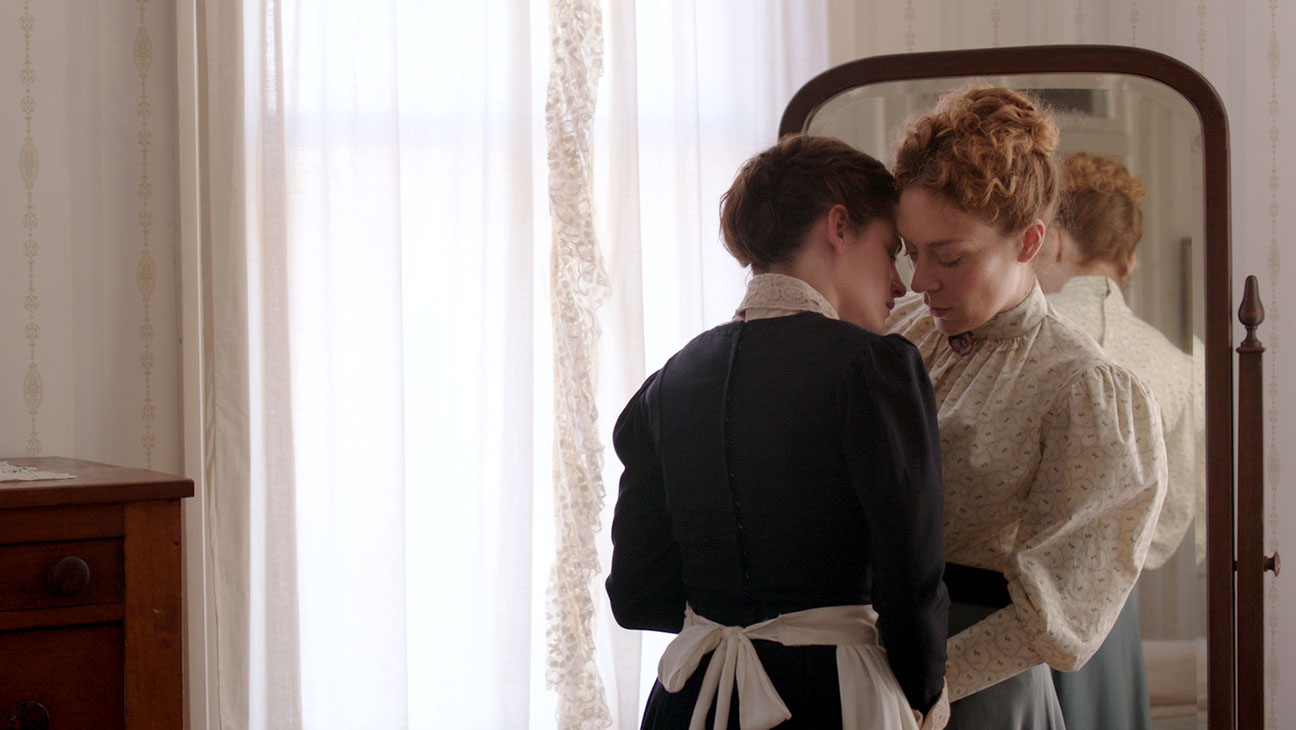LIZZIE
Roadside Attractions/ Saban Films
Reviewed by: Harvey Karten
Director: Craig William Macneill
Screenwriter: Bryce Kass
Cast: Chloë Sevigny, Kristen Stewart, Jamey Sheridan, Fiona Shaw, Kim Dickens, Denis O’Hare, Jeff Perry
Screened at: Park Ave., NYC, 9/11/18
Opens: September 14, 2018
“Yesterday in old Fall River, Mr. Andrew Borden died…”
Considering the low status of women in America during the late 19th century, it’s surprising that the jury took only 90 minutes to find Lizzie Borden not guilty of murdering her father and stepmother. Didn’t they see that she had a strong motive to do the deed? And didn’t they have respect for her father, perhaps the richest man in Fall River (his fortune would be worth $8 million today)? Nor was there any sign, at least in this film, that the man was disliked by the community.
In this version of the Lizzie Borden story, one which has been told and retold in books, TV episodes and movies, the occurrences in Fall River, Massachusetts that made the title character one of the classic cases of multiple murder, Lizzie is played by Chloë Sevigny as a stiff, somewhat repressed woman, an old maid though in her early thirties, as folks called spinsters in 1892.
“Some folks say she didn’t do it/And others say of course she did
But they all agree, Miss Lizzie B/ Was a problem kinda kid”
Nowadays we don’t consider lesbians to be a problem, at least not in blue states, but then, as her father, Andrew Borden (Jamie Sheridan), states, when he witnessed her daughter making whoopee with Bridget the maid (Kristen Stewart), her retorts “You’re an abomination,” to which the daughter comes back in a second with “So are you.”
“Lizzie kinda rearranged him/With a hatchet so they say/ Then she got her mother/In that same old fashioned way.”
Let’s see, now. What might motivate Lizzie to murder her father AND her stepmother Abby (Fiona Shaw)? Could it be that she wanted her hands on that fortune which, after killing Abby (first—before dad, that’s important), she and her sister Emma (Kim Dickens), would get it all? If she killed dad first and stepmom second, the money would got to stepmom’s children from another marriage. That would make the lyrics of the nursery rhyme inaccurate, since of course she killed stepmom an hour or so before rearranging her dad.
“No, you can’t chop your Papa up in Massachusetts/ You know how neighbors love to criticize.”
There’s plenty of reason besides money that would motivate the murder, as her dad was so concerned about what the neighbors thought that she refused to allow Lizzie to go on her own to a concert, then relented, demanding that she be home by midnight..
“You can’t chop your Mama up in Massachusetts/And then blame all the damage on the mice.”
There were no mice in the Borden household but there were caged pigeons, Lizzie’s pets. She kept them in cages until her father decided he’d had enough, that the pigeons would draw the curious hoi polloi to the house, and used the axe to prepare them for dinner. Lizzie cries.
“You can’t chop your Mama up in Massachusetts/ That sort of thing just isn’t very nice.”
The lyrics to the nursery rhyme as you guessed are a terrific example of understatement. I use the poem teaching English classes to demonstrate the power of both understatement and overstatement as literary devices.
As director Craig William Macneill and writer Bryce Kass note, this Andrew Borden is something like the way J. Paul Getty is described in “All the Money in the World.” The latter, a billionaire, would wash his own clothes in a hotel. Borden did without electricity and without indoor plumbing, stating the advantages of frugality. If such skinflint tactics helped him gain a fortune, so be it. But what did he do to enjoy the money, except to terrorize his daughter and repeatedly rape the maid? His wife knows what was going on, but she serve as enabler, hoping to get the money eventually—which gives both her and the maid a motive.
The film brings out the tenderness and sexual feeling that Lizzie has for the maid, and she helped the unlettered lass along by teaching her to read. Two lonely women find each other. It helps that Bridget could serve as an alibi for Lizzie. See nothing, hear nothing, do nothing.
The film does not seek to educate the viewers about the WHAT but more about the WHY, serving admirably to point out four people who might be motivated to murder (the fourth being the old man’s brother John Morse (Denis O’Hare), who called Lizzie some awful names and could have served to back up Andrew Borden’s desire to send both Lizzie and her sister Emma to a lunatic asylum. Such are the conditions of women long before #MeToo that men in black uniforms would, upon petition of the pater familias, cart women off for life.
A well acted story, nice and slow moving with only a modicum of horror. This is not “Hostel 2.”
“Lizzie Borden took an axe/ She gave her mother 40 whacks/ And when she saw what she had done/ She gave her father 41.”
Nope. Count ‘em. 18 for mom, 19 for dad.
106 minutes. © 2018 by Harvey Karten, Member, New York Film Critics Online
Story – B
Acting – B+
Technical – B
Overall – B






